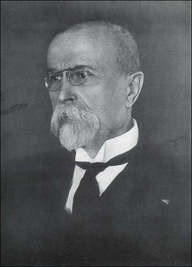
Tomáš Garrigue Masaryk
He was a prominent Czech politician and philosopher and later became the first and legendary President of Czechoslovakia. By the end of his life he was confronted to the threat of Nazism, he did not, however, live to see its surge.
Masaryk came from a simple family. In the year 1869 he entered the Academicke Gymnazium (high-school) and devoted all his time to intense studies, especially of languages and philosophy. In 1872 he completed his high-school education and enrolled at the faculty of philosophy in Vienna. He graduated in 1876 and left to travel in Italy and Germany, during which time he spent a year in Germany at the university in Leipzig. This stay didn’t merely provide Masaryk with an education, but it is also where in June of 1877 he met his future life partner, Charlotte Garrigue, the daughter of a wealthy American businessman from New York. It did not take long before the two were engaged. After returning to Vienna, Masaryk rushed to secure an independent existence and felt the best option was to acquire a lectureship. His plans were however interrupted by news of Charlotte’s injury. He left for America where in 1878 the engaged couple was wed.
He had a strong personality that would defy and divide opinions, partially due to his attitude towards his students; he astonished a conservative environment with his lectures on various taboo subjects (social problems, prostitution, etc.). The situation was the same in the case of his wife, a fully emancipated American woman. Despite this dissimilarity, and the conflicts that ensued, he was accepted and well respected by the Czech society from the very beginning. In 1883 he began to edit the scientific magazine Athanaeum, on the pages of which he published his own interpretation of Gebauer’s essay, offering a new and precise examination
of The Manuscripts of Dvůr Králové and of Zelená Hora. This first resulted in a quarrel that eventually grew into a national scandal, where nationalist sentiments and politics stood against the scientific truth. Masaryk used undisputed arguments and surveys to expose the forgeries, but this cost him the trust of the Czech public. During the manuscript disputes, a group of people sharing the same opinion had come together (J. Gebauer, J. Goll, O. Hostinský, August Seydler), they were then joined by some of the younger followers of Masaryk, represented primarily by J. Herben. This event redirected Masaryk’s interests into a political sphere. His co-workers at the time were J. Kaizl and K. Kramář. The new political direction that they represented was named “Realism” by Masaryk himself. In 1891 he entered the Reichsrat (Austrian Parliament) with a political mandate from the Young Czech Party.
After the outbreak of the First World War he opted for the active opposition against the Austro-Hungarian Monarchy. Before the end of 1914 he left for Italy and following warnings from his friends, he decided not to return. He went to Switzerland (1915) and within a year moved to France, a destination also chosen by E. Benes. Throughout the entire war his heaviest burden and responsibility was for the future of the entire Czech and Slovak nations. With this in mind he participated to the proceedings in England in 1916, in Russia and then in America, which led to the signing of the Pittsburgh Agreement and the Washington Declaration. And while European allies were merely contemplating the breaking-up of Austro-Hungary, Masaryk was able to get the support of the American president Woodrow Wilson for the creation of a new state. That is why he rightly stood at the head of the newly created Czechoslovakia.












